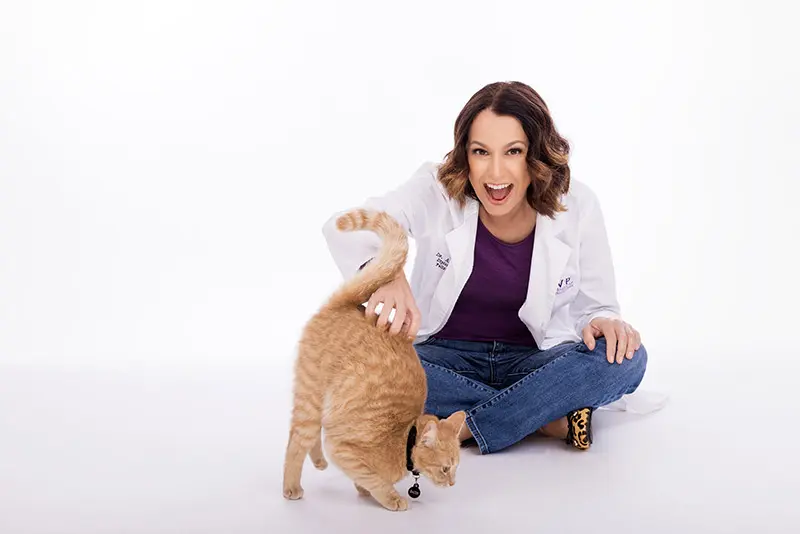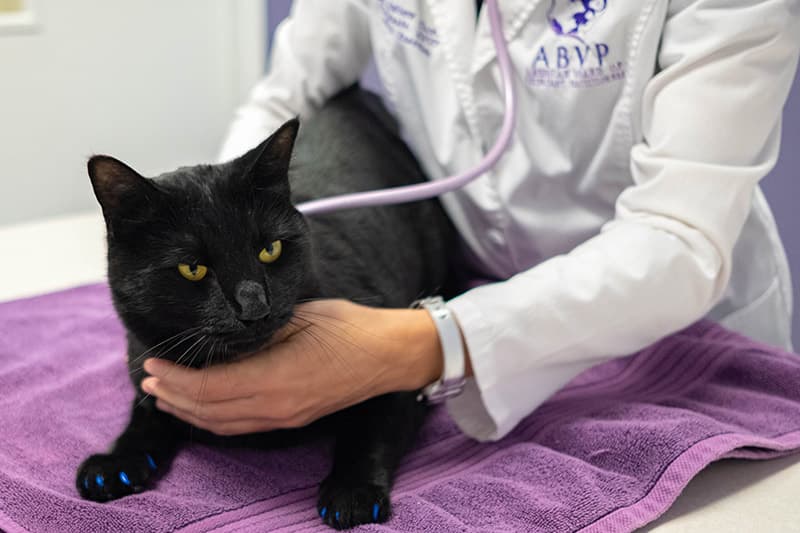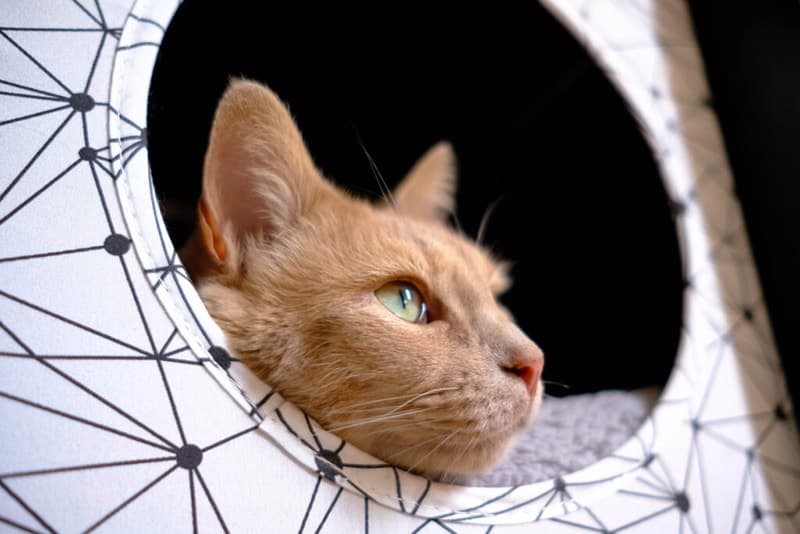In 2005 (when I was still a veterinary student), I attended an online lecture about “Top Feline Toxicities.” I’ve kept a paper copy of that lecture ever since and actually still refer back to it. Most of those toxins (lilies, acetaminophen) are still relevant today. The list of household items that are toxic to cats expands all the time as new products and human drugs enter the market.
Despite educational efforts by organizations such as the ASCPA Poison Control Center and the Pet Poison Helpline, exposure to toxins is still a major issue.
Cats, being the curious creatures they are, are apt to get into trouble, right? They are also capable of opening cabinet doors, jumping onto counters (or above the refrigerator) and playing with things that just seem like a lot of fun. Just look at that tiny little pill rolling around on the floor! It looks like a tasty bug!
Fun Fact: As veterinarians we often use the acronym DAMN-IT (or sometimes DAMN-IT-V) to help us remember all the possible causes of any given presenting sign. For example, the “N” can stand for nutritional or neoplasia (i.e. cancer). The “T” in the acronym stands for toxin. When a cat is sick we always ask, “Could a toxin be causing these signs?”
So let’s review a few household items that may be toxic to your cats. Please note that this is NOT a comprehensive list. Just a quick review to get you thinking about what’s in your home.
Common Household Products That Are Toxic to Cats
Cleaning products
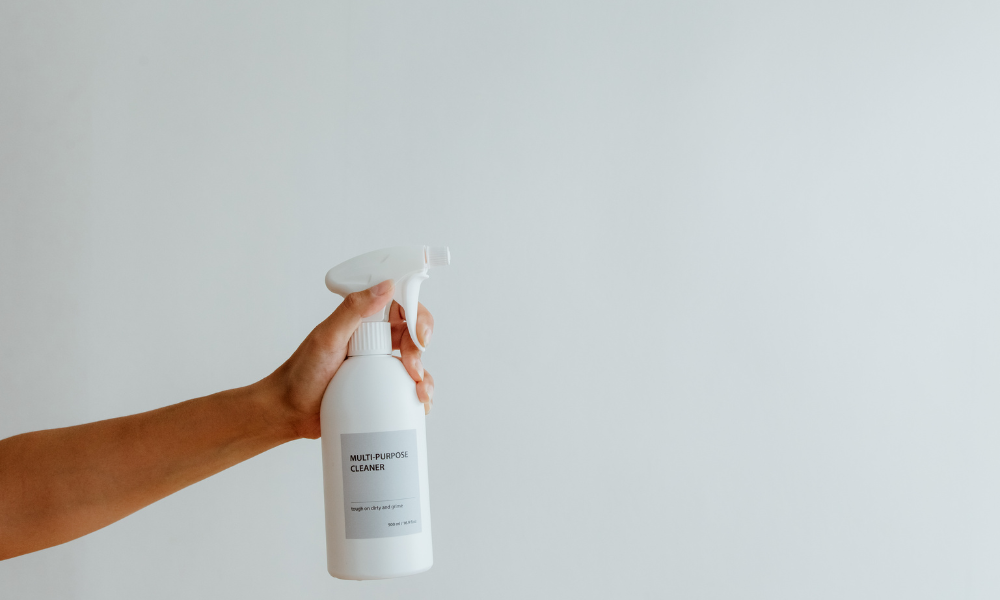 Many cleaning products, such as bleach, ammonia, and disinfectants, contain chemicals that can irritate your cat’s respiratory system and skin. These chemicals can be especially dangerous if your cat comes into direct contact with them or inhales the fumes.
Many cleaning products, such as bleach, ammonia, and disinfectants, contain chemicals that can irritate your cat’s respiratory system and skin. These chemicals can be especially dangerous if your cat comes into direct contact with them or inhales the fumes.
It’s important to be mindful of the cleaning products you use and ensure they are safe for your cat. Here are just a few:
- UNDILUTED Bleach – Just make sure to dilute it out then let it dry afterwards and you should be fine. Use 1 cup bleach to 1 gallon of water. Open the windows to increase air flow when you’re using products such as bleach that have a powerful smell.
- Fabric softener sheets contain detergents that can cause gastrointestinal signs and oral ulceration. In addition, an ingested sheet could cause an intestinal obstruction requiring surgical removal.
- Concentrated or UNDILUTED Vinegar – The only time I like the smell of vinegar is if I’m cooking up some BBQ (North Carolina style requires vinegar as a primary ingredient). But I know many people like to use vinegar as a “natural” cleaning product. That’s fine, but just dilute it out with water. Undiluted, it could cause vomiting, diarrhea and oral ulcers.
Side note: Did you know that Febreeze could cause some skin irritation if your cat comes into contact with the wet product, but overall the ASPCA considers this product to be non-toxic. Good news!
Plants
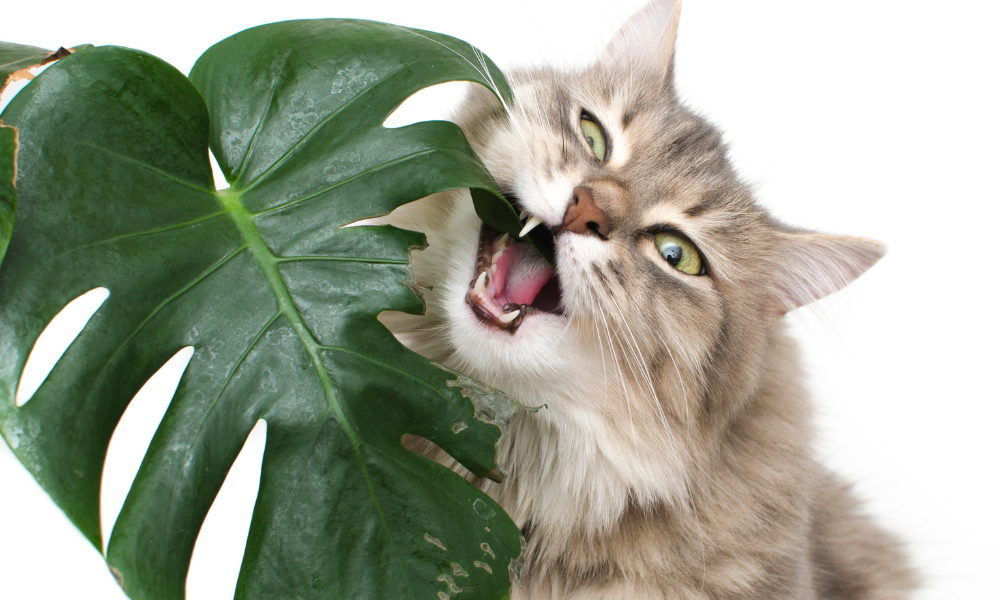 Personally I don’t have live plants inside my home because even if a plant is considered non-toxic my cats will still chew on them and make a mess (which usually involves vomiting up plant pieces). Yes, ANY plant can cause at least a mild GI upset.
Personally I don’t have live plants inside my home because even if a plant is considered non-toxic my cats will still chew on them and make a mess (which usually involves vomiting up plant pieces). Yes, ANY plant can cause at least a mild GI upset.
Popular plants such as lilies, azaleas, and tulips are just a few examples of plants that can cause severe health problems for our feline friends. It’s crucial to research the plants you bring into your home and ensure they are non-toxic to cats.
My go-to site is the ASPCA’s list of plants toxic to cats. The list is SO long! I even refer to this list when I’m looking for plants to have in my yard.
Human Medications
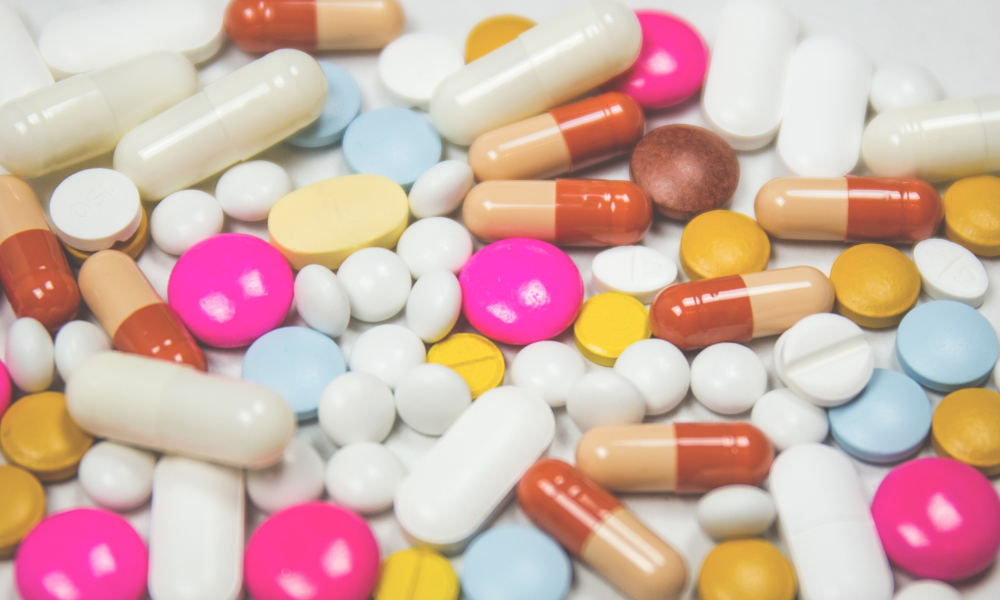 Whether ingested in a pill or liquid form or contacted via a topical cream, so many human medications are dangerous for cats. Never, ever give your cat a human medication without consulting your veterinarian first.
Whether ingested in a pill or liquid form or contacted via a topical cream, so many human medications are dangerous for cats. Never, ever give your cat a human medication without consulting your veterinarian first.
Yes, sometimes we use things like aspirin at low doses for CERTAIN medical conditions, but ONLY for specific cases.
NSAIDs like ibuprofen and naproxen, along with the pain reliever acetaminophen (Tylenol), can kill your cat, plain and simple. Make sure these drugs stay in their child-proof (i.e. cat-proof) containers.
And don’t think that the child-versions are any safer. In fact, sometimes these forms are of a higher toxicity because they are more concentrated.
Topical creams like diclofenac, certain chemotherapy creams, and even topical hormone lotions can cause major issues, either acutely or chronically.
Essential Oils
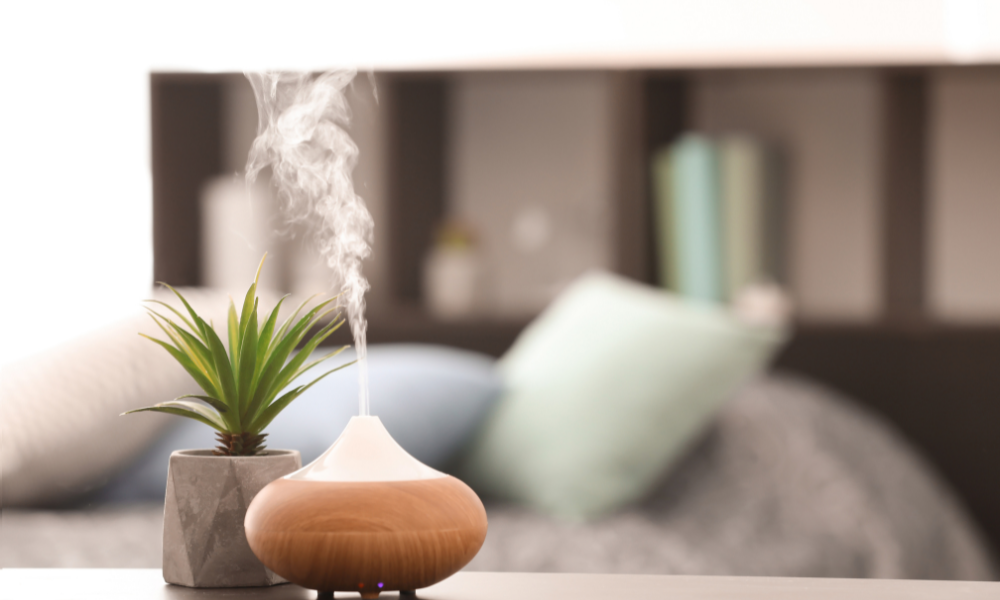
This is a big one because these natural extracts have gained popularity for their aromatic properties and potential health benefits. However certain essential oils can be toxic to cats, ESPECIALLY in their undiluted form. Oils such as tea tree, eucalyptus, and peppermint can cause adverse reactions in cats, including gastrointestinal upset and respiratory issues.
If you use essential oils in your home, make sure to keep them stored securely and away from your cat’s reach. It is generally recommended to avoid essential oil diffusers for long periods of time in areas where your pets are.
Now, even though many scented litters contain essential oils, the amount is so low that it is considered safe. If you read my post on litter box guidelines you’ll know that I don’t recommend anything scented in the litter box (including litter).
(Oh, and if you have a bird, forget about it. No oil diffusers allowed due to their extremely sensitive respiratory tract.)
Liquid potpourri products may or may not contain essential oils, but nonetheless they are toxic either way. Even a few licks could cause ulceration to the mouth. Furthermore, a cat could easily knock over a container of liquid potpourri and get it on her fur. What happens next? She grooms herself, of course.
Want more details about essential oils and pets? Check out this article.
Foods
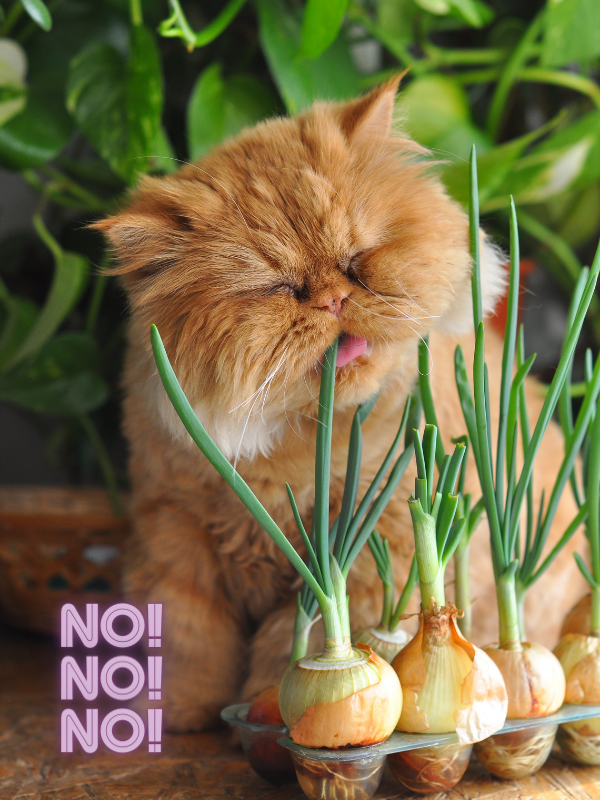 Cats, unlike that other species, are “usually” smart enough to avoid some of the foods that are considered toxic to pets (like chocolate). That applies to every house except mine because if it’s food, Biscuit will eat it.
Cats, unlike that other species, are “usually” smart enough to avoid some of the foods that are considered toxic to pets (like chocolate). That applies to every house except mine because if it’s food, Biscuit will eat it.
But seriously, food like onions, garlic, chives, and raw meat are readily available when you’re cooking dinner and a sneaky cat comes up and takes a lick.
Other Household Products That Are Toxic To Cats
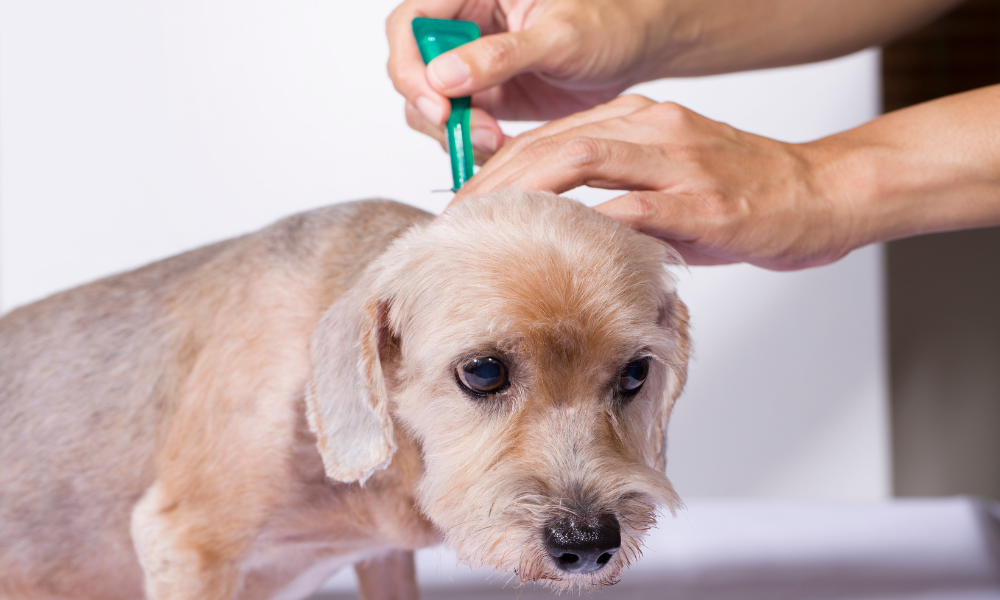
- Dog flea and tick products that contain high concentrations of pyrethrin/pyrethroid. NEVER apply a dog product (such as K9 Advantix) to your cat.
- Mosquito Repellent with DEET – so toxic to pets! Honestly there is no good mosquito repellent for cats (other than keeping them inside). Personally I recommend Revolution Plus for flea, heartworm and intestinal parasite prevention and cross my fingers that it may have some anti-mosquito benefit. A popular skin-softening product made by Avon may be considered but consult your veterinarian first!
- Other products: antifreeze (big time toxin!), insecticides containing organophosphates (or other chemicals), rat poison… the list goes on! Check every product you bring into your home for it’s toxic potential.
Was Your Cat Exposed To A Toxic Household Product? What Should You Do?
Depending on the exposure, you may need to act fast. Symptoms may include vomiting, diarrhea, difficulty breathing, excessive drooling, and lethargy. If you suspect your cat has been exposed to any harmful substances, it is important to seek veterinary attention immediately.
If you’re not sure if an item / drug is toxic or not, pick up the phone and call:
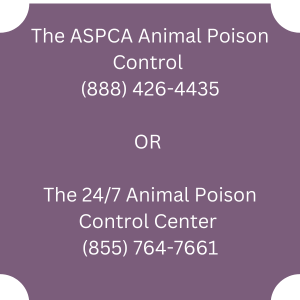
To create a safe home for your cats there are steps you can take.
- Consider using pet-friendly, non-toxic cleaning products that are safe for both you and your cat.
- Keep plants that are toxic to cats out of your home. Don’t just think that you can put them up high in an area your cat cannot access (there’s a first time for everything!).
- Store medications and other potentially dangerous items somewhere like a cabinet that cannot be opened.
By being aware of these potential hazards and taking preventative measures, you can help protect your cat from harm.
Has your cat ever gotten into something she shouldn’t? What did you do? Comment below!

